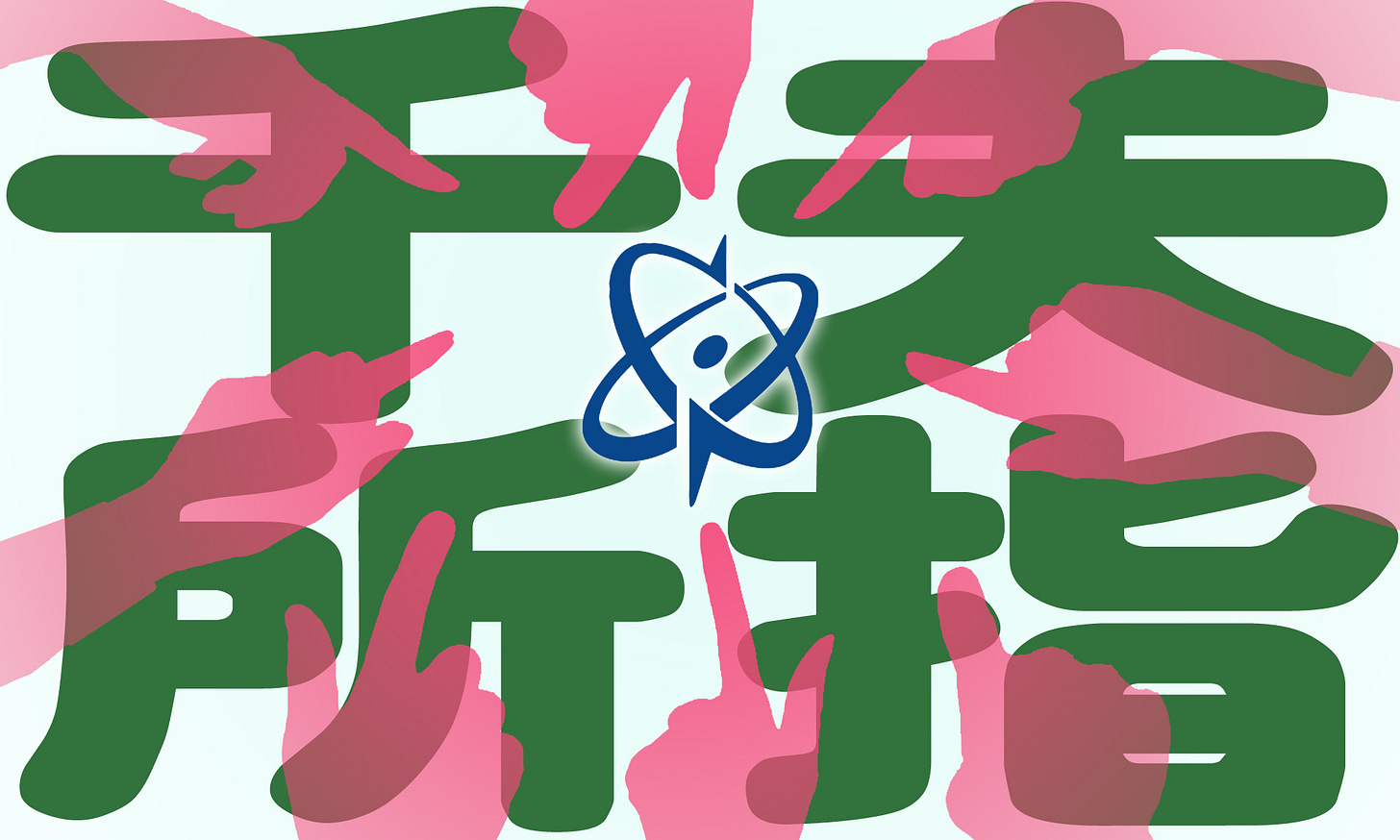Welcome to RealTime Mandarin, a free weekly newsletter that helps you improve your Mandarin in 10 minutes a week.
Subscribe today to get your fluency back, stay informed about China, and communicate with confidence in Chinese — all through immersion in real news.
China National Nuclear Corporation (CNNC, 中核集团), one of China’s largest state-owned enterprises (SOEs), found itself at the centre of online backlash after publishing a blog post on April 6.
The post was about the outcome of company’s spring hiring campaign:
“We received 1,196,273 résumés!
They came from 10 cities and 14 top universities across China. Together with over 100 affiliated organisations, we are hiring for 1,730 key roles.”
我们共收到1196273份简历!
覆盖全国10座城市、14所顶尖高校,联动百余家成员单位,释放1730个核心岗位。
Spring is hiring season in China, often referred to as “golden March, silver April” (金三银四). During this time, millions of new graduates begin the search for their first job, and large state-owned enterprises like CNNC host both online and offline “spring hiring” (春招) events to recruit fresh talent.
However, in recent years, China’s job market has become increasingly tough for graduates. Many struggle to secure employment in an environment where competition is fierce and opportunities are limited.
This has led to the rise of a new term: “Kong Yiji literature” (孔乙己文学), which can also be translated as “Kong Yiji-ism”.
The phrase refers to university graduates who are caught in a dilemma. They can’t land the prestigious, high-paying jobs they hoped for, but at the same time, they’re unwilling to take lower-level positions they feel are beneath their education level.
This phrase is a reference to Kong Yiji (孔乙己), a character in a short story by Lu Xun 鲁迅 published in 1919. Kong is a highly educated, but failed and unemployed scholar living through the fall of the Qing empire. He is out of touch, arrogant, and socially out of place.
Today, Kong has become a fitting symbol for young graduates who can’t land the elite jobs they studied for, leaving them highly qualified but jobless.
It seems CNNC overlooked this reality.
According to their marketing materials, the company received nearly 1.2 million applications for just 1,730 positions, which was part of a broader recruitment drive offering 8,000 roles across the group.
From the company’s perspective, these figures were a mark of success—proof of their strong reputation and appeal as an employer. However, the failure of CNNC’s marketing team to empathise with job seekers led their WeChat update to quickly spiral into a public relations headache.
Online, some netizens sarcastically referred to the post as the company sharing a “congratulatory announcement” (喜报)—an official-sounding term usually reserved for celebrating good news, like winning a major contract or exceeding performance targets, not highlighting the harsh reality facing millions of young job seekers.
As one commenter put it:
“By openly flaunting the number of résumés they received, CNNC is essentially rubbing salt into the wounds of countless jobseekers who can’t find work.”
中核招聘这样赤裸裸地炫耀自己收到的招聘简历数据,这就是在无数找不到工作的求职者身上撒盐。
Another observed:
“Some netizens felt that by showing off like this, they were turning other people’s struggles into a shiny KPI for themselves.”
还有网友认为,他们这样炫耀,就是在将他人的困境看成自己漂亮的KPI。
Following the strong online backlash, CNNC followed the crisis communications playbook often used by state-owned companies:
delete the original post
publish a toned-down version
move on as if nothing ever happened
But the damage had already been done, as one widely shared comment put it:
“Yesterday’s post on CNNC’s official WeChat account was meant to show off.
Instead, it backfired spectacularly and made them the target of widespread public condemnation.”
中核集团昨天本来只是想在自家公众号上炫耀一番,却不小心翻车了,成为舆论场上千夫所指的对象。
Public discussion quickly returned to a familiar theme: the difficult realities facing China’s young graduates.
A widely circulated report from a recruitment platform last year revealed that 51% of graduating students now rank “job stability” (稳定最重要) as their top priority, above “salary and benefits” (薪酬福利).
In today’s uncertain job market, state sector positions have become increasingly attractive, echoing the “civil service exam fever” (考公热) we explored last year.
While these jobs may not offer the high salaries of the private sector, they do promise something far more valued right now by young people, which is long-term security.
But the demand far exceeds the supply.
Which is exactly why CNNC’s self-congratulatory post struck such a nerve with so many people.
So that’s what we’re unpacking in this week’s episode.
🎧RTM Podcast Preview
This week on the RTM Advanced podcast, we’re diving into the language of arrogance and self-importance, and how to describe situations like CNNC’s PR disaster in natural, authentic Mandarin:
喜报 – “Congratulatory announcement”—in this context used critically to describe selective, overly positive messaging. (Listen at 10:24)
沾沾自喜 – “Smug” or “self-satisfied”—describing someone who’s overly pleased with themselves. (Listen at 13:14)
高高在上 – “High and mighty”—used to describe someone acting superior or out of touch. (Listen at 14:29)
We’ll unpack each phrase, explore how they’re used in real life, and show you how to sound like a native when discussing arrogance, image, and reputation in Chinese.
Favourite Five
1. 喜报 xǐ bào
good news, congratulatory announcement
这篇文章的标题,太像一份喜报了 – The title of this article makes it sound like they are celebrating a win. [1]
2. 翻车 fān chē
to crash, to backfire publicly
大型央企中核集团昨天本来只是想在自家公众号上炫耀一番,却不小心翻车了 – The major state-owned company CNNC just wanted to show off a bit on its official account yesterday, but it backfired to their surprise. [2]
3. 自私自利 zì sī zì lì
selfish, self-centered
中核这份喜报,真的太自私自利了,失去了起码的体面与体恤 – This achievement update shows that CNNC is truly selfish, with no basic decency or empathy. [2]
4. 千夫所指 qiān fū suǒ zhǐ
condemned by all, under fire from all sides
中核集团昨天本来只是想在自家公众号上炫耀一番,却不小心翻车了,成为舆论场上千夫所指的对象 - Yesterday’s post on CNNC’s official WeChat account was intended as a show off, but to their surprise it didn’t go down well, and they were under fire from all sides. [2]
Learn more in Sinica Phrase of the Week on Sunday!
5. 伤口撒盐 shāng kǒu sǎ yán
to rub salt in the wound
在对数以千万计困在求职漩涡的人们伤口撒盐 – They are rubbing salt in the wounds of tens of millions people who struggle to find a job. [3]
💡 Ready to bridge the gap to real-world fluency? 💡
Every RTM+ post is packed with tools to help you get fluent.
RTM+ is designed to fit your busy life, your learning style, and your level. Whether you’re “intermediate”, “advanced but rusty”, or “fluent with gaps”, you’ll get content that’s practical, engaging, and easy to stick with.
RTM+ gives you everything you need to build momentum and finally break through your plateau towards real-world fluency. 👇















